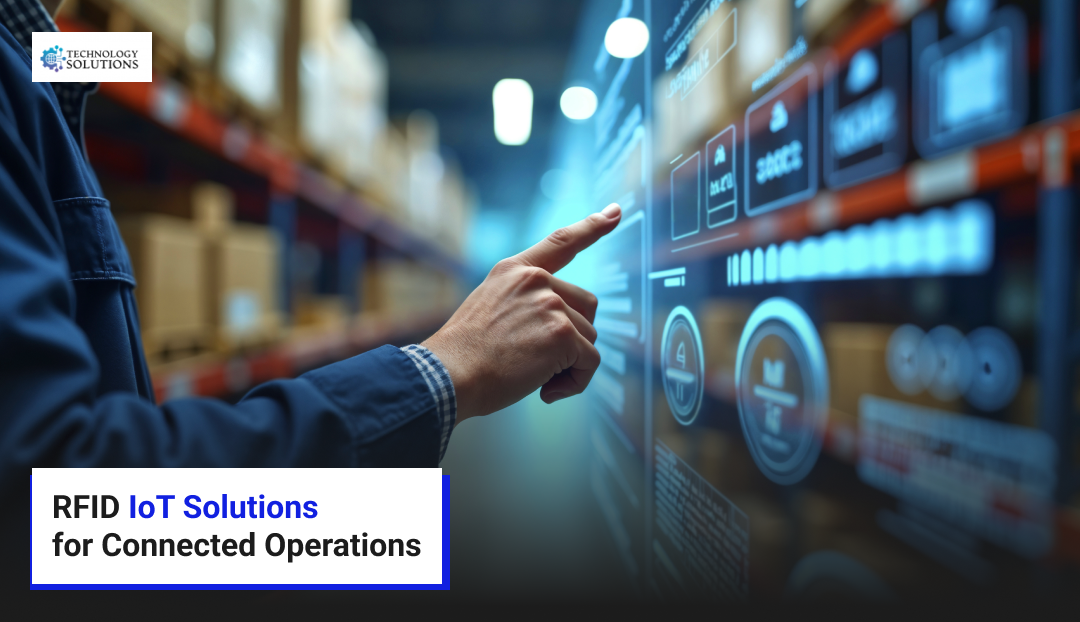In the era of digital transformation, businesses are increasingly turning to RFID IoT solutions to streamline operations, improve asset visibility, and drive smarter decision-making. Whether you’re managing inventory, tracking assets, or optimizing supply chains, RFID (Radio Frequency Identification) combined with the Internet of Things (IoT) forms a powerful synergy that enables real-time, connected operations across industries.
In this blog, we’ll explore how RFID IoT solutions are revolutionizing operational efficiency, why companies are investing in this technology, and how to choose the right RFID IoT service provider for long-term ROI.
What are RFID IoT Solutions?
RFID IoT solutions refer to the integration of RFID technology with IoT systems to create intelligent, connected networks that collect, transmit, and analyze data in real time.
-
RFID uses electromagnetic fields to automatically identify and track tags attached to objects.
-
IoT connects these RFID systems to cloud platforms or software for centralized monitoring and data analytics.
Together, they enable companies to digitize workflows, reduce manual labor, and automate tracking systems—turning passive data into proactive business intelligence.
Key Industries Benefiting from RFID IoT Solutions
Implementing RFID IoT solutions for connected operations is not limited to one sector. Here are some of the top industries leveraging this technology:
1. Retail and E-commerce
-
Real-time inventory tracking
-
Automated stock replenishment
-
Theft prevention with smart shelf monitoring
2. Manufacturing
-
Equipment and tool tracking
-
Predictive maintenance
-
Production line monitoring
3. Logistics and Supply Chain
-
Cold chain monitoring
-
Route optimization
-
Freight tracking and proof of delivery
4. Healthcare
-
Patient and equipment tracking
-
Pharmaceutical inventory control
-
Safety compliance with asset tagging
5. Aviation and Automotive
-
Spare part traceability
-
Vehicle assembly tracking
-
Ground support equipment management
Commercial Benefits of RFID IoT Solutions
Companies deploying RFID IoT solutions are seeing significant commercial advantages, such as:
✅ Operational Efficiency
Automate repetitive processes like scanning barcodes or checking inventory manually. This cuts down on human error and labor costs.
✅ Real-Time Visibility
Gain end-to-end visibility of assets and operations, improving decision-making and reducing delays in logistics or production.
✅ Scalability
Whether you’re managing a single warehouse or a global fleet, RFID IoT systems scale with your business.
✅ Cost Reduction
Minimize losses from theft, spoilage, or misplacement. Optimize resource allocation based on real-time usage patterns.
✅ Improved Customer Satisfaction
Faster order fulfillment, better product availability, and accurate delivery tracking contribute to better customer experiences.
Why Businesses Are Investing in RFID IoT Solutions
With increasing pressure to digitize operations, businesses are choosing RFID IoT solutions because they:
-
Provide real-time data insights for predictive analytics.
-
Enable automated compliance reporting in regulated industries.
-
Offer centralized cloud dashboards to control operations from anywhere.
-
Allow integration with ERP, WMS, and CRM systems for unified workflows.
By working with a reliable RFID IoT solutions provider, companies can tailor technology to fit their unique industry requirements and scale efficiently.
Core Components of an RFID IoT Solution
To successfully deploy RFID IoT technology, it’s essential to understand the key components involved:
📡 1. RFID Tags
These are small electronic devices attached to items. They store data and respond to signals from RFID readers.
📍 2. RFID Readers
These devices detect and read data from RFID tags, either handheld or fixed.
☁️ 3. IoT Gateways
They act as a bridge between RFID readers and cloud applications, enabling real-time data transmission.
💻 4. Cloud Software / Platform
The control center of the system—where all data is analyzed, visualized, and managed.
🔌 5. Integration APIs
APIs allow integration with third-party systems like inventory databases or logistics platforms for seamless automation.
RFID IoT Use Cases for Connected Operations
Here are some practical examples of how RFID IoT systems are being implemented in real-world operations:
🔄 Automated Inventory Management
A retail chain uses RFID IoT to update stock levels in real-time, reducing out-of-stock events and overstocking.
🚚 Smart Logistics Tracking
A logistics company tags freight containers to monitor their location, temperature, and handling during transit, improving transparency.
🏭 Factory Floor Visibility
Manufacturing plants use RFID sensors on machines and tools to ensure optimal utilization and maintenance scheduling.
🏥 Healthcare Asset Monitoring
Hospitals tag medical equipment and pharmaceuticals, ensuring availability when needed and avoiding over-ordering or expiry losses.
Choosing the Right RFID IoT Solutions Provider
To get the most out of your investment, you need a trusted RFID IoT consulting company that understands your industry and operational needs. Here’s what to look for:
-
✅ Industry Experience Choose a provider with proven success in your sector (e.g., retail, logistics, healthcare).
-
✅ Customization Capabilities RFID IoT should be tailored—not one-size-fits-all. Look for a partner that offers flexible hardware and software options.
-
✅ Cloud & API Integration Ensure the provider offers seamless integration with your existing systems and third-party platforms.
-
✅ Scalability & Support Your business will grow—make sure your provider offers scalable solutions and 24/7 technical support.
-
✅ Security Standards Data security and encryption are non-negotiable in modern connected systems.
Future Trends in RFID IoT Technology
The evolution of RFID IoT is far from over. As AI, machine learning, and 5G become more widespread, we can expect innovations such as:
-
Edge Computing: Processing data closer to the source for faster decisions.
-
AI-Driven Analytics: Using RFID-generated data to predict maintenance or customer behavior.
-
Blockchain Integration: Enhancing traceability and transparency in supply chains.
-
Sustainable IoT Devices: Low-power and biodegradable RFID tags for eco-conscious operations.
Final Thoughts
The demand for RFID IoT solutions for connected operations is only growing—and for good reason. Businesses that embrace this technology are more agile, data-driven, and equipped to meet modern challenges. Whether you’re optimizing a warehouse, tracking global shipments, or managing critical healthcare assets, RFID IoT technology delivers unmatched value in visibility, efficiency, and ROI.
Partnering with a reliable RFID IoT consulting company ensures a smooth implementation process and a solution tailored to your unique goals. Now is the time to make your operations smarter, faster, and future-ready.

